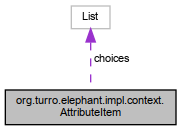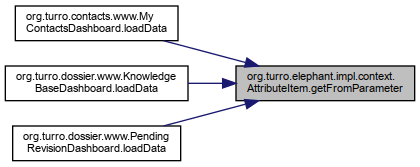◆ AttributeItem() [1/4]
| org.turro.elephant.impl.context.AttributeItem.AttributeItem |
( |
String |
name, |
|
|
Boolean |
value, |
|
|
Boolean |
defaultValue |
|
) |
| |
Creates a new instance of AttributeItem
Definition at line 47 of file AttributeItem.java.
49 value.booleanValue() ?
"true" :
"false",
51 defaultValue.booleanValue() ?
"true" :
"false");
◆ AttributeItem() [2/4]
| org.turro.elephant.impl.context.AttributeItem.AttributeItem |
( |
String |
name, |
|
|
Number |
value, |
|
|
Number |
defaultValue |
|
) |
| |
Creates a new instance of AttributeItem
Definition at line 55 of file AttributeItem.java.
57 ObjectString.formatNativeObject(value,
true),
59 ObjectString.formatNativeObject(defaultValue,
true));
◆ AttributeItem() [3/4]
| org.turro.elephant.impl.context.AttributeItem.AttributeItem |
( |
String |
name, |
|
|
Date |
value, |
|
|
Date |
defaultValue |
|
) |
| |
Creates a new instance of AttributeItem
Definition at line 63 of file AttributeItem.java.
65 ObjectString.formatObject(value, ObjectString.COMPRESSED_DATE_PATTERN,
true),
67 ObjectString.formatObject(defaultValue, ObjectString.COMPRESSED_DATE_PATTERN,
true));
◆ AttributeItem() [4/4]
| org.turro.elephant.impl.context.AttributeItem.AttributeItem |
( |
String |
name, |
|
|
String |
value, |
|
|
int |
type, |
|
|
String |
defaultValue |
|
) |
| |
◆ addChoice()
| void org.turro.elephant.impl.context.AttributeItem.addChoice |
( |
String |
choice | ) |
|
◆ getBooleanValue() [1/2]
| boolean org.turro.elephant.impl.context.AttributeItem.getBooleanValue |
( |
| ) |
|
◆ getBooleanValue() [2/2]
| boolean org.turro.elephant.impl.context.AttributeItem.getBooleanValue |
( |
boolean |
defaultValue | ) |
|
◆ getChoices()
| List org.turro.elephant.impl.context.AttributeItem.getChoices |
( |
| ) |
|
◆ getDateValue() [1/2]
| Date org.turro.elephant.impl.context.AttributeItem.getDateValue |
( |
| ) |
|
Definition at line 148 of file AttributeItem.java.
150 return (Date) ObjectString.parseString(v, ObjectString.COMPRESSED_DATE_PATTERN, Date.class,
false);
◆ getDateValue() [2/2]
| Date org.turro.elephant.impl.context.AttributeItem.getDateValue |
( |
Date |
defaultValue | ) |
|
◆ getDoubleValue() [1/2]
| double org.turro.elephant.impl.context.AttributeItem.getDoubleValue |
( |
| ) |
|
Definition at line 99 of file AttributeItem.java.
100 return ((Double) ObjectString.parseNativeString(
getValue(), Double.class,
true)).doubleValue();
◆ getDoubleValue() [2/2]
| double org.turro.elephant.impl.context.AttributeItem.getDoubleValue |
( |
double |
defaultValue | ) |
|
◆ getFromParameter()
| static AttributeItem org.turro.elephant.impl.context.AttributeItem.getFromParameter |
( |
IConstructor |
constructor, |
|
|
String |
name, |
|
|
String |
defaultValue |
|
) |
| |
|
static |
Definition at line 176 of file AttributeItem.java.
177 String[] values = constructor.getParameterValues(
name);
AttributeItem(String name, Boolean value, Boolean defaultValue)
static final int STRING_ATTR
◆ getIntegerValue() [1/2]
| int org.turro.elephant.impl.context.AttributeItem.getIntegerValue |
( |
| ) |
|
Definition at line 110 of file AttributeItem.java.
111 return ((Integer) ObjectString.parseNativeString(
getValue(), Integer.class,
true)).intValue();
◆ getIntegerValue() [2/2]
| int org.turro.elephant.impl.context.AttributeItem.getIntegerValue |
( |
int |
defaultValue | ) |
|
◆ getLongValue() [1/2]
| long org.turro.elephant.impl.context.AttributeItem.getLongValue |
( |
| ) |
|
◆ getLongValue() [2/2]
| long org.turro.elephant.impl.context.AttributeItem.getLongValue |
( |
long |
defaultValue | ) |
|
◆ getValue() [1/2]
| String org.turro.elephant.impl.context.AttributeItem.getValue |
( |
| ) |
|
◆ getValue() [2/2]
| String org.turro.elephant.impl.context.AttributeItem.getValue |
( |
String |
defaultValue | ) |
|
◆ setBooleanValue()
| void org.turro.elephant.impl.context.AttributeItem.setBooleanValue |
( |
boolean |
value | ) |
|
◆ setValue()
| void org.turro.elephant.impl.context.AttributeItem.setValue |
( |
String |
value | ) |
|
◆ choices
| List org.turro.elephant.impl.context.AttributeItem.choices = null |
◆ name
| String org.turro.elephant.impl.context.AttributeItem.name |
◆ STRING_ATTR
| final int org.turro.elephant.impl.context.AttributeItem.STRING_ATTR = 0 |
|
static |
◆ type
| int org.turro.elephant.impl.context.AttributeItem.type |
The documentation for this class was generated from the following file:
















